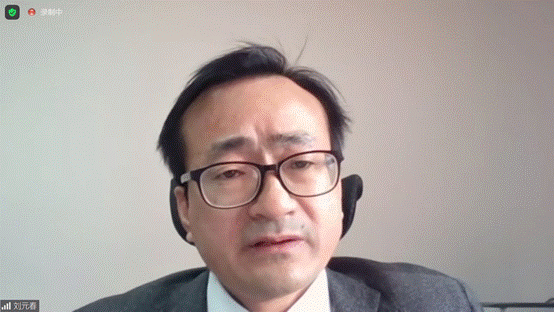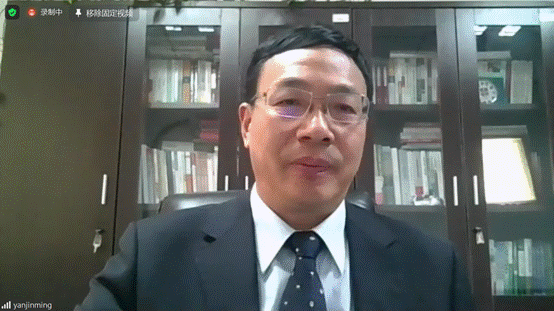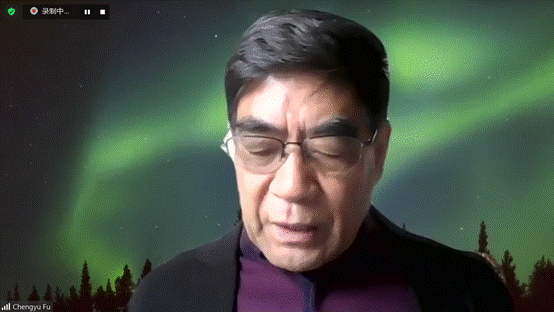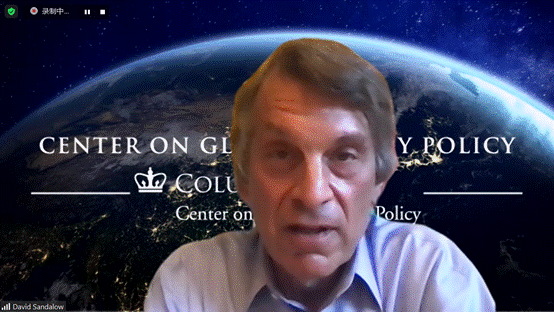 Research Update
Research Update
13
Apr
Co-hosted by the National Academy of Development and Strategy of RUC and the Center on Global Energy Policy of Columbia University, and co-organized by National Academy of Belt and Road Green Development (NABRGD), CICEC and t International Energy and Environment Strategy Studies (CIERSS) of RUC, the China-U.S. Climate Change Cooperation Closed-Door Roundtable was successfully held online.
The roundtable was jointly planned and organized by Xu Qinhua, Vice Dean of National Academy of Development and Strategy (NADS), Director of Center for International Energy and Environment Strategy Studies (CIERSS), RUC, and David Sandalow, former Vice Minister of the U.S. Department of energy and Inaugural Fellow of Center on Global Energy Policy of Columbia University. More than 50 experts and scholars from China and the United States were invited to deliver speeches. The roundtable includes keynote remarks and three thematic sessions.
It is the common interest of the world to deal with climate change. To prevent climate disaster and realize green recovery and sustainable development, it is necessary to raise trillions of dollars for low-carbon technology and market application in the next few decades, which largely depends on the progress of the world's two major carbon emitters, the United States and China. Even if there are major differences on other issues, China and the United States have the opportunity to cooperate on climate change. Ahead of the Climate Leaders' Summit on April 22, Renmin University of China and Columbia University invited the representatives of government, industry, academia, research, and business from China and the US to discuss current trends of "climate change" and options for meaningful cooperation in mobilizing significant funding for low-carbon development. The roundtable is part of a series of events for the 15th Conference of the Parties to the Convention on Biological Diversity (COP15) to be held in China in 2021. It is also the fifth seminar since the signing of MoU between RUC and Columbia University in 2017.

Professor Liu Yuanchun, Vice President of Renmin University of China delivered the welcome and opening remarks for the roundtable.
Liu said, it is at a crucial juncture whether China and the United States can start a new course of development in the Biden administration in the "post-Trump era". After China and the United States have repositioned their respective positions, competition, cooperation, and confrontation may take on different forms in different fields. However, in the current stage of transition from an intense collision in the past to multiple forms, whether competition, cooperation, or confrontation will dominate the main theme of China-U.S. relations depends on how the two sides conduct in some details, how they adopt feasible forms of cooperation through in-depth dialogues. At present, we have reached a very important consensus that China and the United States share common interests in the fields of climate, carbon neutrality, energy, etc. Therefore, China and the United States, especially between Chinese and American universities, can conduct comprehensive cooperation around energy issues, climate issues, green finance, sharing economy, etc. Experts conduct in-depth discussion, in-depth cooperative research, and establish a feasible international cooperative research system to research issues of common concern.
I hope that with this closed-door roundtable as a starting point, Chinese and American experts and scholars can often focus on the common challenges facing the two countries, and hold such influential and high-quality academic forums to promote China-U.S. cooperation in a wide range of areas, including climate cooperation, green finance, and cultural exchanges. The team has produced positive and important research results in the process of international cooperation.

Yan Jinming, Executive Dean of National Academy of Development and Strategy at RUC chaired the opening and keynote remarks session. Yan said, he hopes to see the exchanges between experts from China and the United States going from online to offline as soon as possible.
Fu Chengyu, Standing Committee Member of the 12th CPPCC National Committee and former chairman of China Petroleum and Chemical Corp (Sinopec), said that China and the United States are already in a community with a shared future, and they should shoulder common responsibilities. As the world's two largest economies, and also the largest carbon emitters, China and the United States have both responsibilities and meanings to set an example for the international community and make greater contributions to combating climate change. The two countries are fully able to actively carry out cooperation in joint response to climate change in some important areas, including actively promoting the development and application of new technologies in the fields of wind energy, solar energy, and hydrogen energy, etc.

Sandro said that as long as China and the United States are willing to cooperate, they can always find ways to cooperate, and the societies and residents of the two countries can also cooperate. In terms of cooperation, green finance is definitely a better field. Both China and the United States are playing a leading role in green finance. China has made a lot of achievements in green finance and the United States has also made a lot of efforts in green finance, both in terms of mechanism and assets. President Biden has just issued an agreement to promote green finance. The government encourages new companies to actively develop green finance, hoping to promote the process of climate change cooperation. China and the United States have a foundation for cooperation.
In the session of "Mobilizing Capital", Ma Xianfeng, Vice President at China Institute of Finance and Capital Markets (CIFCM), Deputy Director of Green Finance Committee at China Society for Finance and Banking; Deborah Lehr, Vice Chairman and Executive Director of Paulson Institute; Zhai Yongping, Chief of Energy Sector Group of the Asian Development Bank; Ethan Zindler, Head of Americas of Bloomberg New Energy Finance; Luo Yu, Deputy Director of BRI Research Center of National Academy of Development and Strategy (NADS), Associate Professor in finance of RUC; Zhang Junjie, Director of the Environmental Research Center at Duke Kunshan University; and Julio Friedmann, Senior Research Scholar of Center on Global Energy Policy at Columbia University, conducted discussions and free discussions from different angles.
In the session of "Harmonizing Standards", opinions were expressed by Liu Fan, Deputy General Manager of China Central Depository & Clearing Co., Ltd; Michael Eckhart, Adjunct Professor of Columbia SIPA and Director of Environmental Finance Department at Citigroup; Liu Qiang, Director of Programmes of Children Investment Fund Foundation(CIFF)at China office; Rob Youngman, Team Leader for Green Finance and Investment of the Environment Directorate of the Organisation for Economic Co-operation and Development (OECD); and Wang Ke, Deputy Director of BRI Research Center, National Academy of Development and Strategy (NADS), Associate Professor of School of Environment, RUC. Other guests including Eric Redman, CEO of Thunderbolt Energy, and David Victor, professor of international relations at the University of California, San Diego, attended this session.
In the session of "Climate Collaboration on Third Country Market", there was an active dialogue between Chai Qimin, Director of Department of Strategic Planning in National Center for Climate Change Strategy and International Cooperation (NCSC); Ilmi Granoff, Director of Sustainable Finance in Climate Works Foundation; Shi Xunpeng, Principal Research Fellow at Australia-China Relations Institute in the University of Technology Sydney and President of International Society for Energy Transition Studies; and Vikram Widge, Senior Advisor of Climate Finance and Climate Policy Initiative. Other guests attended this session, including Liu Xu, Executive Director of Centre for International Energy and Environment Strategy Studies (CIEESS) in Renmin University of China; Bruce Usher, Professor of Professional Practice in Columbia Business School; Gracie Sun, Senior Advisor of the Paulson Institute and Managing Director of the Green Finance Center; and Geoffrey Heal, Donald C. Waite III Professor of Social Enterprise at Columbia Business School.
Other participants are Yang Fanxin, Director of International Cooperation Department of National Academy of Development and Strategy (NADS) at RUC; Sheng Yan, Non-Resident Fellow of Center on Global Energy Policy at Columbia University; WANG Peng, Assistant Researcher of Center for Belt and Road Center at National Academy of Development and Strategy at RUC; and Sally Qiu, Research Associate of Center on Global Energy Policy at Columbia University.
In 2017, with the support of the International Office of RUC, RUC and Columbia University signed the MoU to help enable the Parties to explore possible opportunities for collaboration in mutually-agreed areas of research and other scholarly activities. The first academic cooperation activity was held in the Pulitzer Prize Hall of Columbia University. With the support of the seed fund of the Research Office of RUC, the collaborative researches between the universities’ teams have been carried out so far. For example, "the Belt and Road" green development index have produced significant policy reference and academic influence in promoting the "the Belt and Road" green development.
For this roundtable, the US Embassy in China was authorized by the Washington government as an observer.